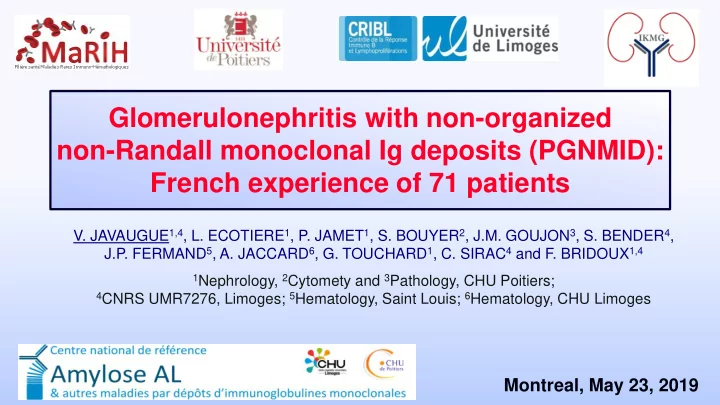

Glomerulonephritis with non-organized non-Randall monoclonal Ig deposits (PGNMID): French experience of 71 patients V. JAVAUGUE 1,4 , L. ECOTIERE 1 , P. JAMET 1 , S. BOUYER 2 , J.M. GOUJON 3 , S. BENDER 4 , J.P. FERMAND 5 , A. JACCARD 6 , G. TOUCHARD 1 , C. SIRAC 4 and F. BRIDOUX 1,4 1 Nephrology, 2 Cytomety and 3 Pathology, CHU Poitiers; 4 CNRS UMR7276, Limoges; 5 Hematology, Saint Louis; 6 Hematology, CHU Limoges Montreal, May 23, 2019
Disclosures None
Previous studies More than 20 case reports and small series 1985 2004 2011 2015 2018 2009 2017
Inclusion criteria • Patients with monotypic glomerular deposits (1993-2018) • Granular electron-dense deposits by EM, resembling immune complex GN • No clinical and biological evidence of cryoglobulinemia 71 patients Chemotherapy Symptomatic treatment n=35 n=21 Immunosuppressive therapy Undetected Detected n=15 B-cell clone B-cell clone n=20 n=15
Clinical characteristics at presentation • Mean age: 59 years (rang : 24-86 years) • Renal presentation : - Renal insufficiency: 73% (CKD stage 3 = 50%, stage 4 = 33%, stage 5 = 17%) - Proteinuria: 100% (mean = 4.8 g/24h) - Nephrotic syndrome: 59% - Hematuria: 85% - Hypertension: 79% • Hypocomplementemia: 18% (low C3 +/- C4) • No extra-renal manifestation Renal-limited disorder
Pathological findings (LM) 1 0 0 8 0 6 0 % 4 0 14% 2 0 75% 0 N N N G l G G P s i a M u g o n n a a r s b e M m 11% e M
Pathological findings (IF) IgG-PGNMID (n=55) 1 0 0 77% 83% 8 0 10% % 6 0 6% 4 0 7% 13% 2 0 4% 0% 0 1 2 3 4 G G G G I g I g I g I g γ3 κ λ
Pathological findings (EM) Subepithelial Mesangial Subendothelial 0 0 0 0 0 0 2 4 6 8 0 1
Hematological characteristics at presentation IgA-PGNMID (n=4) IgM-PGNMID (n=7) LC-PGNMID (n=5) IgG-PGNMID (n=55) IFE+FLC 86% 75% 29% 80% IFE Abnormal FLC 0 0 0 0 0 0 0 0 0 0 0 0 5 0 5 0 5 0 1 5 0 1 1 % % 1 % % B-cell clone? B-cell clone? 15% 100% 80% 75% Plasmacytic (n=4) Symptomatic MM (n=2) Symptomatic MM (n=1) Lymphoplasmacytic (n=4) CLL (n=2) Indolent MM (n=2) Plasmacytic (n=2) MZL (n=3) Unknown (n=1) MZL(n=2) Unknown (n=1) Unknown (n=47) The detection rate and the nature of the B-cell clone differ according to the subtype of PGNMID
Treatment and outcome Clone detected with clone-directed therapy n=15 Whole cohort Chemotherapy No clone detected with empirical therapy n=20 1 0 0 • CyBorD n=13 IgG-PGNMID Renal survival IS therapy • RTX-CYC-D n=4 IgG-PGNMID Symptomatic • RTX-BorD n=3 IgG-PGNMID 5 0 Rituximab n=4 IgG-PGNMID CYC +/- Pred n=4 (IgG-PGNMID, n=3; LC-PGNMID, n=1) p =0,04 MMF n=3 IgG-PGNMID 0 Prednisone n=4 (IgG-PGNMID, n=3; IgA-PGNMID, n=1) 0 5 0 1 0 0 Months Proven or suspected Clone-directed cohort clone-directed approach 1 0 0 Renal survival seems effective 5 0 Clone detected n=15 IgG3k-PGNMID No clone detected n=20 n=18/20 p =0,09 0 0 5 0 1 0 0
IgG3k-PGNMID : clone detection? Only patients with negative immunofixation and normal FLC at baseline Serum immunoblot Immunoglobulin Repertoire (n=20) Sequencing (n=12) IgG3k detectable in 11 cases
RepSeq analysis (1 patient) vidjil 2017.03 Sensitivity of M-spike (IgGk) was detectable at one-year follow-up immunofixation?
RepSeq analysis (11 patients) vidjil 2017.03 Is it really monoclonal in all cases: oligoclonal ? In progress…
Conclusion • Renal limited disorder with constant proteinuria • Nature and rate of detection of B-cell clone varying according to the subtype of PGNMID • Clone-directed approach seems effective to improve renal outcome • Physiopathology of IgG3k-PGNMID is still unknown RepSeq analysis (bone marrow) vs. Proteomic analysis (kidney)
Thank you Collaborators • APHP : • Bichat – Pr VRTOVSNIK • Cergy Pontoise – Dr MONTSENY • CHRU Tours – Dr GATAULT • Henri Mondor – Dr REMY, Dr STEHLE • Necker – Pr KNEBELMANN, Dr HUMMEL • CH Aix en Provence – Dr COZETTE • CH Avignon – Dr GOBERT • CHU Amiens – Pr CHOUKROUN, Dr LECAQUE • CH Bourg en Bresse – Dr TOUSSAINT, Dr ORFEUVRE • CHU Besançon – Dr BAMOULID • CH Boulogne sur Mer – Dr MESBAH • CHU Bordeaux – Dr RIGOTHIER • CH Cambrai – Dr MORABITI • CHU Clermont-Ferrand – Dr TIPLE, Dr GARROUSTE • CH Chambéry – Dr FOURCADE • CHU Dijon – Pr MOUSSON, Dr ZANETTA, Dr LEGENDRE • CH Douai – Dr CARDON, Dr MOREL • CHRU Lille – Pr HAZZAN, Dr PROVOT, Dr FRIMAT • CH Dunkerque – Dr BEAUMONT • CH Metz – Dr MAURIER, Dr MOUGENOT, Dr GUERARD • CHU Lyon – Dr NOUVIER, Dr KARLIN, Dr CARDOZO • CH Montceau les mines – Dr MONARD • CHU Rouen – Dr POUSSART, Dr KHUZAIE • CH Périgueux – Dr QUERON • CHU Toulouse – Dr RIBES, Dr MEHRENBERGER • CH Roubaix – Dr LE MONIES • CH Tournai – Dr MADHOUN • CH Valenciennes – Dr VANHILLE, Dr ULRICH, Dr LEMOINE
Recommend
More recommend